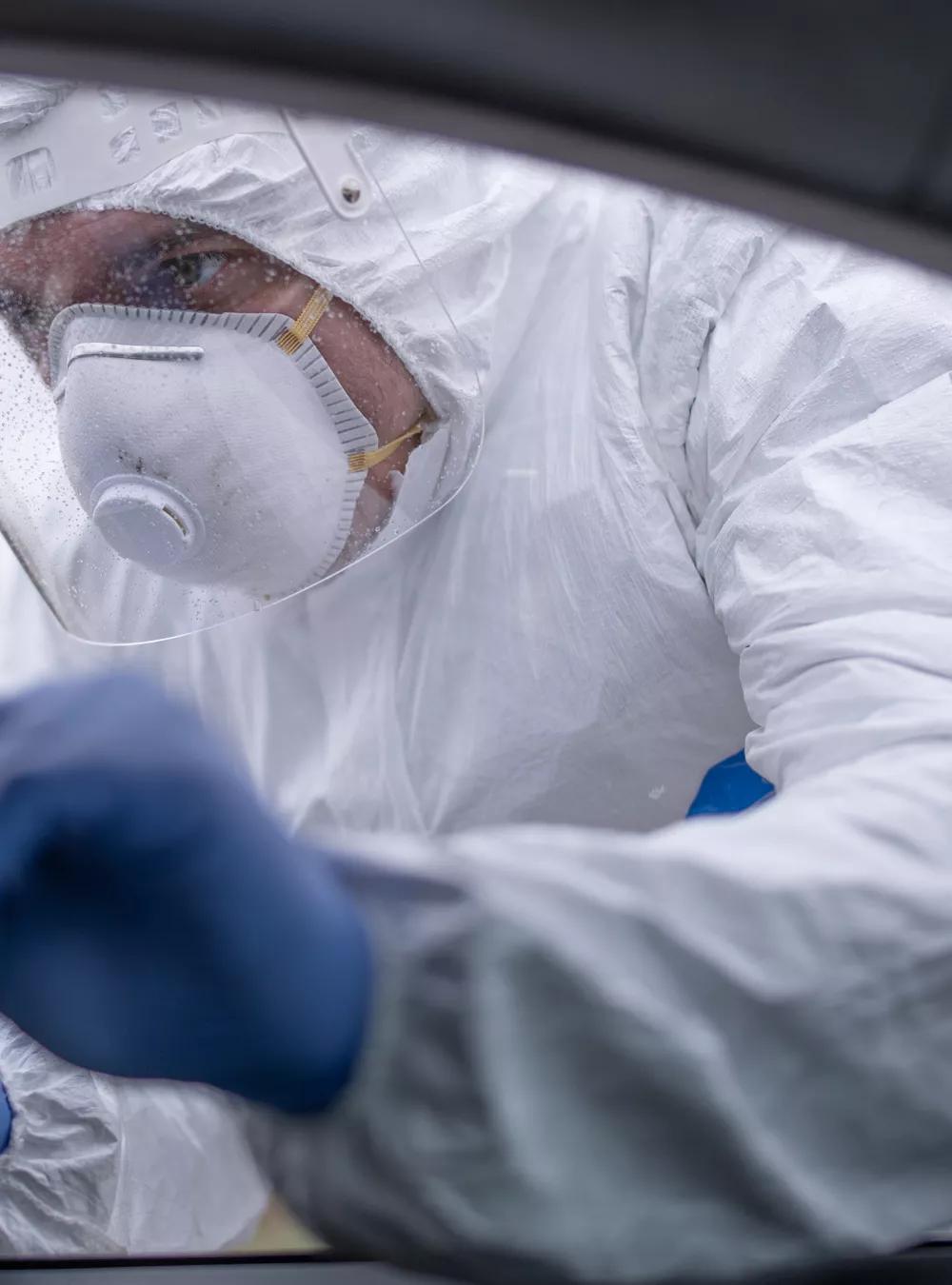Amid rising coronavirus cases and global supply shortages, MITRE experts serve a key role in the $1.5 billion effort to rapidly accelerate simple, fast, and accurate wide-scale testing.

Accelerating Innovations for Testing in the Fight Against COVID-19
Imagine you and your child at your nearby big box store, shopping for school supplies. You toss pens, pencils, and notebooks into the cart. As you reach for a pack of highlighters, a text comes in. It’s the results of the COVID-19 test you both took upon entering the store—15 minutes prior.
“The vision is for testing to be that accessible—and delivery of results that fast. People can then make informed decisions about whether to travel, send their child to school, or go into the office,” says Jen Madsen, who leads MITRE’s support to the National Institutes of Health’s Small Business Education and Entrepreneurial Development (SEED) office.
Enter the Rapid Acceleration of Diagnostics (RADx) initiative, part of our work under SEED. RADx is working toward the goal of deploying millions of COVID-19 antigen and virus tests per day by December 2020 to point-of-care locations. These include office-based physicians, pharmacies, and community health clinics. Some tests may be performable in businesses, schools, or ultimately even your home.
Additionally, RADx supports innovative technologies that will help large laboratories vastly increase their throughput and reduce results turnaround. The program is also working on identifying technologies for reporting positive test results. That could influence decisions on things like public health surveillance, contact tracing, and isolation of those infected.
Moving Technologies to Market, at Record Speed
Through SEED, MITRE serves as a trusted adviser to NIH, which oversees RADx, a program funded by the Paycheck Protection Program and Health Care Enhancement Act and launched on April 29. We offer critical thought leadership, as well as connect the dots across NIH, the Food and Drug Administration, and other agencies. To help execute RADx, NIH stood up carefully designed panels of experts to assist in accelerating innovations.
These experts include Madsen as well as Franziska Moeckel, another MITRE specialist on regulatory processes. Both serve on the RADx steering panel that reviews technologies that have requested NIH funding and support.
Madsen says, “When the pandemic hit and RADx launched, we quickly responded to NIH’s needs for additional regulatory and commercialization expertise on laboratory and in vitro diagnostic testing.”
MITRE helps NIH make informed decisions about which technologies show the most promise in meeting the goal of at-scale testing this fall and beyond.
That’s a huge challenge, in the context of today’s reality. For example, Quest Diagnostics, a Fortune 500 laboratory company, recently announced an average turnaround in COVID-19 test results of seven-plus days for non-priority patients.
Quest stated, ‘we will not be in a position to reduce our turnaround times as long as cases of COVID-19 continue to increase dramatically across much of the United States. This is not just a Quest issue…[it] affects the laboratory industry as a whole.’
RADx approaches this whole-of-industry challenge collaboratively. Madsen and Moeckel coordinate daily with more than 200 others across government, academia, and industry.
The end game? No searching for scant testing appointments. No need for a prescription to get a test. No waiting in long lines at testing centers. Imagine walking into your local drug store and purchasing a COVID-19 test that renders rapid results.
Navigating the “Valley of Death”
What makes the testing process so cumbersome?
With 30-plus years’ combined regulatory and industry experience, Madsen and Moeckel know well the long and complex path to getting new medical technologies onto the market.
Potential pitfalls include the notorious “Valley of Death.” The industry label applies to the gap between NIH funding of basic science research and industry funding for big clinical studies.
This is especially an issue for academic researchers and smaller businesses, which may not have the resources to cross the valley. Without supporting resources to traverse this gap, even the best innovations risk dying on the vine.
Against RADx’s criteria of low-cost, fast, and simple, many technologies being developed have never been seen before. That can raise substantial FDA policy questions.
From a regulatory standpoint, Madsen and Moeckel highlight these issues. Concerns are then addressed jointly through a strong working relationship between the FDA, NIH, and members of the broader RADx team.
“It’s our job to raise the flag and say, ‘We’re seeing lots of different companies that all need help with this [fill in the blank] particular question,” Madsen says.
In this way, MITRE helps facilitate a national goal to “improve the transition of federally funded innovations from the laboratory to the marketplace."
Out of the Shark Tank, into the Fight
Part of the late stages of NIH’s Shark Tank process, Madsen and Moeckel work closely with the rest of the steering panel vetting innovations.
Madsen explains that every day, the RADx team talks with grant recipients and tries to understand whether projects are meeting milestones. Innovations must navigate the early development phases to de-risk their technologies and prepare for clinical validation studies to collect necessary data to support their applications to FDA.
MITRE helps NIH consider big questions: Are researchers collecting the necessary evidence to get their products through the FDA Emergency Use Authorization process? Do they have a good plan in place to manufacture and distribute millions of tests in a matter of months?
Additionally, Moeckel emphasizes the importance of striking the delicate balance between rapid acceleration and public health.
“It’s a fine line when issuing Emergency Use Authorization to innovators,” Moeckel says. “Acceleration is good, but we have to do so responsibly and mitigate risks of harm.”
Madsen adds, “Our work under RADx makes us part of the solution. We’re helping to bring exciting technologies into the marketplace at record speed—ultimately improving patient care and overall public health.”
—by Denise Schiavone